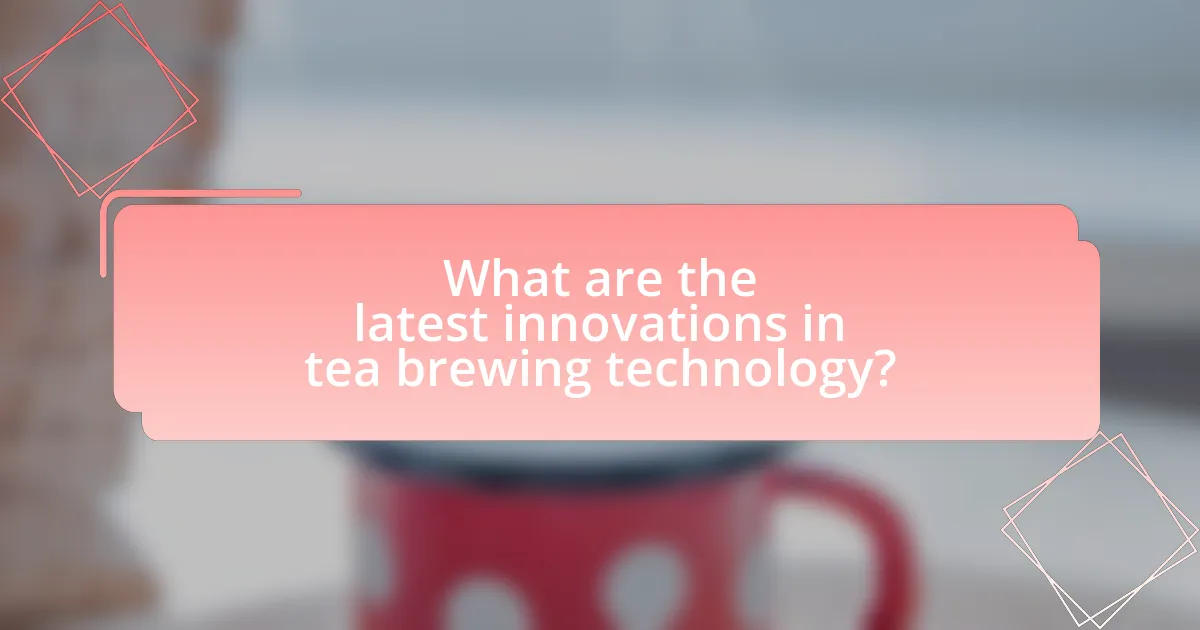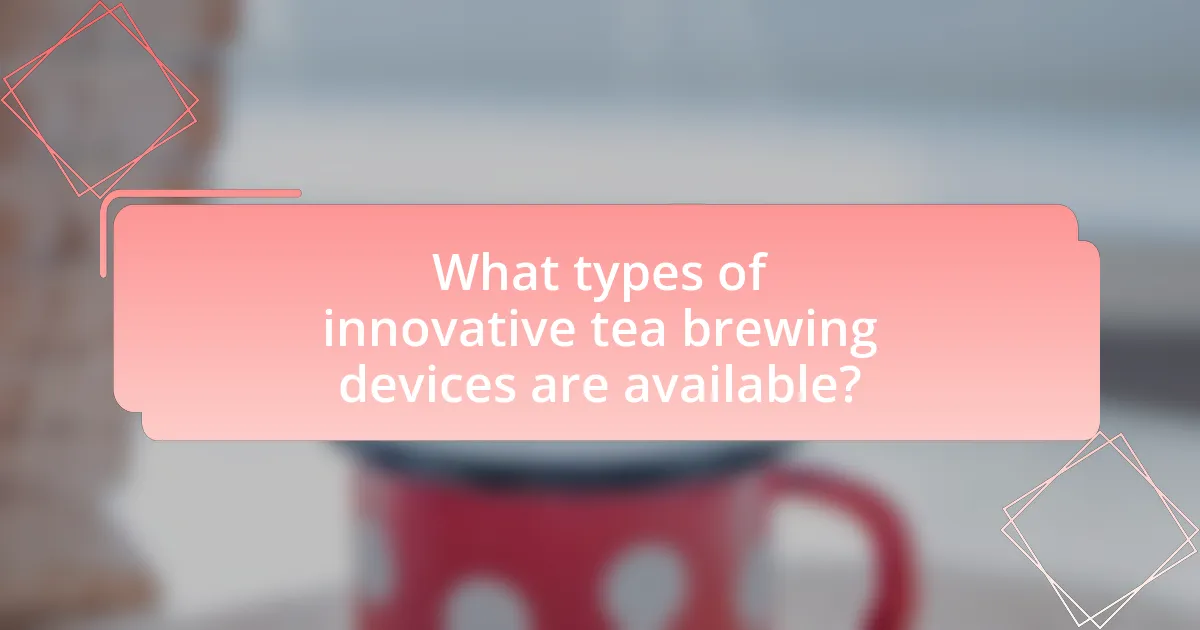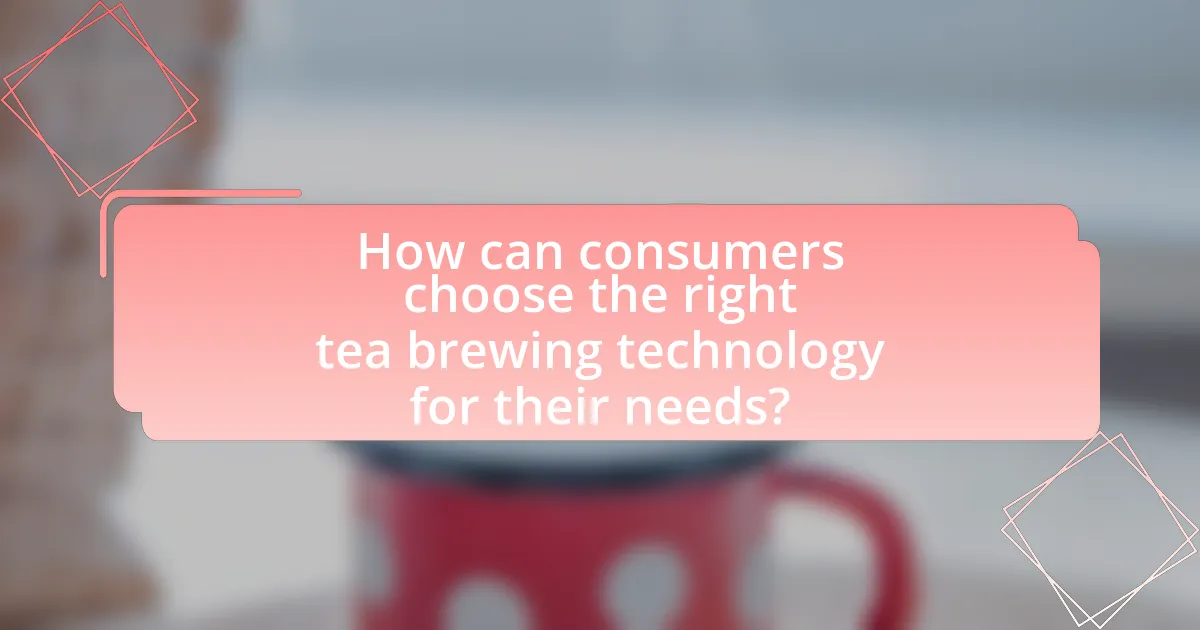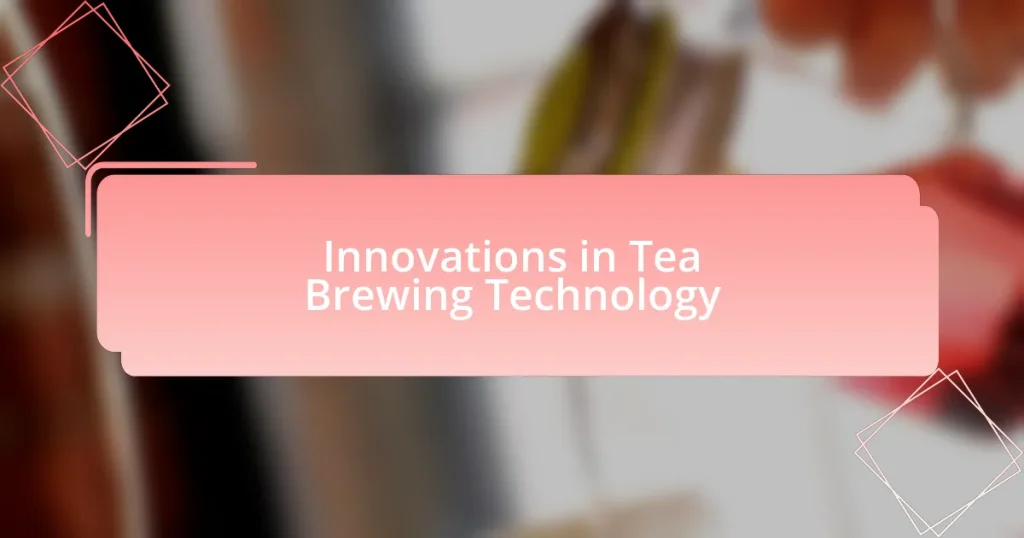The article focuses on innovations in tea brewing technology, highlighting advancements such as smart tea makers and precision temperature control devices that enhance flavor extraction and brewing efficiency. It discusses how these technologies automate the brewing process, allowing for customization of steeping times and temperatures tailored to specific tea types. Key features of modern brewing devices, including app connectivity and automated systems, are examined, along with their impact on flavor consistency and health benefits. Additionally, the article provides guidance on selecting the right brewing technology based on personal preferences and budget considerations, as well as best practices for maximizing flavor and quality in tea preparation.

What are the latest innovations in tea brewing technology?
The latest innovations in tea brewing technology include smart tea makers that utilize precise temperature control and steeping time adjustments to enhance flavor extraction. These devices often feature app connectivity, allowing users to customize their brewing preferences remotely. For instance, the Breville Tea Maker can automatically adjust the temperature and steeping time based on the type of tea selected, ensuring optimal brewing conditions. Additionally, advancements in materials, such as the use of ceramic and stainless steel, improve heat retention and flavor preservation. These innovations reflect a growing trend towards personalization and convenience in tea preparation, catering to the evolving preferences of tea enthusiasts.
How have advancements in technology influenced tea brewing methods?
Advancements in technology have significantly influenced tea brewing methods by introducing precision and automation. Modern electric kettles with temperature control allow users to brew different types of tea at optimal temperatures, enhancing flavor extraction. Additionally, smart tea makers can automate the brewing process, adjusting steeping time and temperature based on the specific tea type, which improves consistency and quality. Research indicates that these innovations lead to a more refined tea experience, as studies show that precise brewing conditions can enhance the release of beneficial compounds in tea, such as catechins and flavonoids.
What specific technologies are being integrated into modern tea brewing?
Modern tea brewing integrates several specific technologies, including smart kettles, temperature control devices, and automated brewing systems. Smart kettles allow users to set precise temperatures and brewing times via smartphone apps, enhancing flavor extraction. Temperature control devices ensure optimal brewing conditions for different tea types, as various teas require specific temperatures for ideal flavor profiles. Automated brewing systems, such as those from brands like Breville and Teavana, offer programmable settings that can adjust steeping times and temperatures automatically, ensuring consistency and convenience. These technologies collectively improve the brewing process, making it more efficient and tailored to individual preferences.
How do these technologies enhance the brewing process?
Innovations in tea brewing technology enhance the brewing process by improving extraction efficiency and flavor consistency. Advanced brewing devices, such as precision temperature kettles and automated steeping systems, allow for precise control over water temperature and steeping time, which are critical for optimal flavor extraction. Research indicates that maintaining specific temperature ranges can significantly affect the release of aromatic compounds and essential oils from tea leaves, leading to a more flavorful cup. For example, studies show that brewing green tea at 70-80°C yields higher concentrations of catechins, enhancing both taste and health benefits. Additionally, smart brewing technologies can monitor and adjust parameters in real-time, ensuring that each brew meets the desired quality standards consistently.
What are the benefits of using innovative tea brewing technologies?
Innovative tea brewing technologies enhance the quality and efficiency of tea preparation. These technologies, such as precision temperature control and automated brewing systems, ensure optimal extraction of flavors and nutrients, resulting in a superior taste profile. For instance, studies show that brewing tea at the correct temperature can increase the release of beneficial compounds like catechins and flavonoids, which are linked to health benefits such as improved heart health and antioxidant properties. Additionally, these technologies often reduce brewing time, making the process more convenient without compromising quality.
How do these innovations improve flavor extraction?
Innovations in tea brewing technology improve flavor extraction by utilizing advanced methods such as precise temperature control, optimized steeping times, and innovative brewing devices. These technologies enhance the solubility of flavor compounds by ensuring that the tea leaves are exposed to optimal conditions, which allows for a more efficient release of essential oils and polyphenols. For instance, studies have shown that brewing at specific temperatures can significantly increase the extraction of catechins, which are key flavor components in tea. Additionally, devices like vacuum brewing systems can create a pressure differential that further aids in extracting flavors from the leaves, resulting in a richer and more complex taste profile.
What impact do they have on brewing time and efficiency?
Innovations in tea brewing technology significantly reduce brewing time and enhance efficiency. For instance, advanced brewing devices like electric kettles with precise temperature control and automated steeping mechanisms can cut brewing time by up to 50% compared to traditional methods. Additionally, innovations such as tea infusers that optimize water flow and extraction rates improve the efficiency of flavor extraction, ensuring that the tea reaches its optimal taste profile more quickly. These advancements not only streamline the brewing process but also allow for consistent quality in each cup, demonstrating their positive impact on both time and efficiency in tea preparation.

What types of innovative tea brewing devices are available?
Innovative tea brewing devices include smart tea makers, electric kettles with temperature control, and tea infusers with built-in timers. Smart tea makers, such as the Breville Tea Maker, allow users to customize steeping times and temperatures for different tea types, ensuring optimal flavor extraction. Electric kettles with temperature control, like the Cuisinart CPK-17, enable precise heating to specific temperatures ideal for various teas, enhancing the brewing process. Additionally, tea infusers with built-in timers, such as the Adagio Teas IngenuiTEA, simplify the brewing process by automatically timing steeping durations, providing convenience and consistency. These devices represent advancements in tea brewing technology, improving the overall tea experience.
How do smart tea brewers differ from traditional methods?
Smart tea brewers differ from traditional methods by incorporating technology to automate and optimize the brewing process. Unlike traditional brewing, which relies on manual timing and temperature control, smart tea brewers utilize sensors and programmable settings to ensure precise brewing conditions tailored to specific tea types. For example, smart brewers can adjust water temperature and steeping time automatically based on the selected tea, enhancing flavor extraction and consistency. This technological advancement allows for a more user-friendly experience, as many smart brewers can be controlled via smartphone apps, providing convenience and customization that traditional methods lack.
What features do smart tea brewers offer for customization?
Smart tea brewers offer several features for customization, including adjustable brewing temperature, steeping time, and tea strength settings. These features allow users to tailor their tea experience according to personal preferences, ensuring optimal flavor extraction. For instance, many smart tea brewers can be programmed to heat water to specific temperatures, which is crucial for different types of tea, such as green or black tea, that require varying temperatures for ideal brewing. Additionally, users can set precise steeping times to avoid bitterness or under-extraction, enhancing the overall quality of the tea. Some models even include customizable profiles for different tea types, enabling users to save their preferred settings for future use.
How do these devices connect to other smart home technologies?
Tea brewing devices connect to other smart home technologies primarily through Wi-Fi and Bluetooth protocols. These connectivity options allow tea brewers to integrate with smart home ecosystems, enabling users to control brewing settings remotely via smartphone apps or voice assistants. For instance, many modern tea brewers can sync with platforms like Amazon Alexa or Google Assistant, allowing for voice-activated commands. Additionally, some devices utilize IFTTT (If This Then That) to create automated routines, such as starting the brewing process when a user arrives home. This interoperability enhances user convenience and streamlines the tea brewing experience within a connected smart home environment.
What role do temperature control and precision play in tea brewing technology?
Temperature control and precision are critical in tea brewing technology as they directly influence the extraction of flavors, aromas, and beneficial compounds from tea leaves. Optimal brewing temperatures vary by tea type; for instance, green tea typically requires lower temperatures around 70-80°C, while black tea is best brewed at 90-100°C. Precise temperature regulation ensures that the delicate compounds are extracted without bitterness or astringency, enhancing the overall quality of the beverage. Studies have shown that maintaining specific temperature ranges can improve the release of catechins and other antioxidants, which are essential for health benefits associated with tea consumption. Therefore, advancements in temperature control technology, such as smart kettles and brewing devices, enable users to achieve consistent and high-quality tea brews.
How does precise temperature control affect different types of tea?
Precise temperature control significantly influences the flavor, aroma, and overall quality of different types of tea. For instance, green tea is best brewed at lower temperatures, typically between 160°F to 180°F, to prevent bitterness and preserve its delicate flavors. Conversely, black tea requires higher temperatures, around 200°F to 212°F, to fully extract its robust flavors and tannins. Oolong tea falls in between, with optimal brewing temperatures ranging from 190°F to 200°F, allowing for a balance of floral and creamy notes. Research indicates that brewing tea at the correct temperature enhances the extraction of beneficial compounds, such as catechins in green tea and theaflavins in black tea, thereby maximizing health benefits and taste profiles.
What innovations are being made in temperature regulation systems?
Innovations in temperature regulation systems for tea brewing include the development of smart kettles that utilize precise temperature control technology. These kettles often feature integrated sensors and Wi-Fi connectivity, allowing users to set and monitor temperatures remotely via smartphone applications. For instance, brands like Breville and Cuisinart have introduced kettles that can maintain specific temperatures for different types of tea, ensuring optimal flavor extraction. Additionally, some systems now incorporate PID (Proportional-Integral-Derivative) controllers, which enhance temperature stability and reduce fluctuations during the brewing process. This technology is supported by research indicating that maintaining a consistent temperature can significantly improve the quality of brewed tea, as different tea varieties require specific temperature ranges for ideal extraction.

How can consumers choose the right tea brewing technology for their needs?
Consumers can choose the right tea brewing technology by assessing their brewing preferences, desired tea types, and convenience needs. For instance, those who prioritize flavor and aroma may prefer traditional methods like loose leaf brewing, while individuals seeking speed and ease might opt for electric kettles or single-serve machines. Additionally, understanding the temperature and steeping time requirements for different teas can guide consumers toward technologies that offer precise controls, such as temperature-controlled kettles or smart tea brewers. Research indicates that consumers who match their brewing technology to their specific tea preferences experience enhanced satisfaction and flavor extraction, reinforcing the importance of aligning technology with personal needs.
What factors should be considered when selecting a tea brewing device?
When selecting a tea brewing device, key factors include the type of tea being brewed, the brewing method, temperature control, and ease of use. Different teas, such as green, black, or herbal, require specific brewing temperatures and times for optimal flavor extraction. The brewing method, whether it is a traditional teapot, a modern electric kettle, or a specialized tea infuser, impacts the quality of the brew. Temperature control is crucial, as precise heating can enhance the taste and aroma of the tea. Additionally, ease of use and cleaning can significantly affect the overall brewing experience, making it important to choose a device that fits personal preferences and lifestyle.
How do personal preferences influence the choice of brewing technology?
Personal preferences significantly influence the choice of brewing technology by determining the desired flavor profile, convenience, and health benefits of the tea. For instance, individuals who prioritize flavor may opt for traditional methods like loose leaf brewing, which allows for a fuller extraction of flavors, while those seeking convenience might choose single-serve machines or tea bags. Additionally, preferences for health benefits can lead consumers to select specific brewing technologies that optimize antioxidant extraction, such as cold brew methods. Research indicates that consumer choices are often guided by taste preferences, lifestyle, and perceived health advantages, shaping the market for various brewing technologies.
What budget considerations should consumers keep in mind?
Consumers should consider the total cost of ownership when investing in tea brewing technology, which includes the initial purchase price, maintenance costs, and energy consumption. For instance, high-end electric kettles or smart tea brewers may have a higher upfront cost but can save money over time through energy efficiency and reduced waste. Additionally, consumers should evaluate the cost of compatible accessories and ingredients, as some advanced brewing systems may require specific types of tea or filters that can add to ongoing expenses. According to a study by the National Tea Association, consumers who invest in quality brewing technology often experience enhanced flavor and satisfaction, which can justify the initial investment.
What are some best practices for using innovative tea brewing technologies?
Best practices for using innovative tea brewing technologies include selecting the appropriate brewing temperature and time for different tea types, utilizing precise measurements for tea leaves and water, and maintaining equipment cleanliness to ensure optimal flavor extraction. For instance, green teas typically require lower temperatures (around 160-180°F) and shorter steeping times (1-3 minutes), while black teas benefit from higher temperatures (around 200-212°F) and longer steeping times (3-5 minutes). Research indicates that precise control over these variables can enhance the sensory qualities of the tea, leading to a better tasting experience. Additionally, regular maintenance of brewing devices, such as cleaning tea infusers and kettles, prevents residue buildup that can alter flavor profiles.
How can users maximize flavor and quality with these devices?
Users can maximize flavor and quality with tea brewing devices by selecting the appropriate temperature and steeping time for different tea types. For instance, green tea typically requires a lower temperature of around 160-180°F and a steeping time of 2-3 minutes, while black tea benefits from boiling water at 200-212°F for 3-5 minutes. This precision in brewing conditions enhances the extraction of essential oils and flavors, resulting in a more aromatic and flavorful cup. Research indicates that optimal brewing parameters can significantly influence the sensory attributes of tea, as demonstrated in studies published in the Journal of Food Science, which highlight the correlation between temperature, time, and flavor profile.
What common troubleshooting tips should users be aware of?
Common troubleshooting tips for users in tea brewing technology include ensuring the correct water temperature, using the appropriate tea-to-water ratio, and checking the freshness of the tea leaves. For instance, different types of tea require specific temperatures for optimal extraction; green tea typically brews best at around 175°F, while black tea is best at 200°F. Additionally, a standard ratio of one teaspoon of loose leaf tea per cup of water can enhance flavor, and using stale tea can lead to a lackluster brew. These practices help users achieve the best results in their tea brewing experience.


